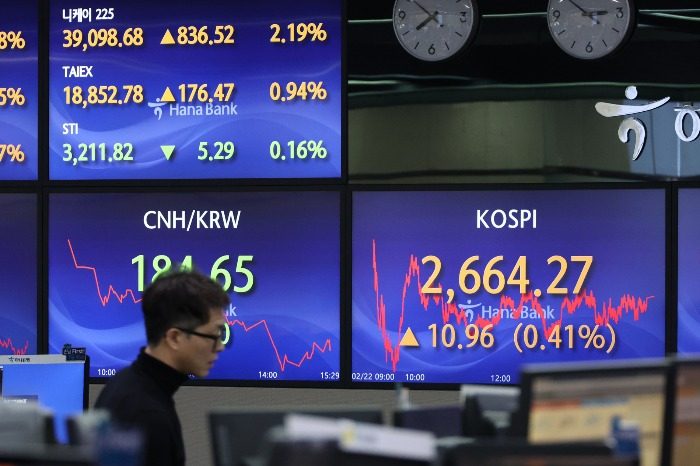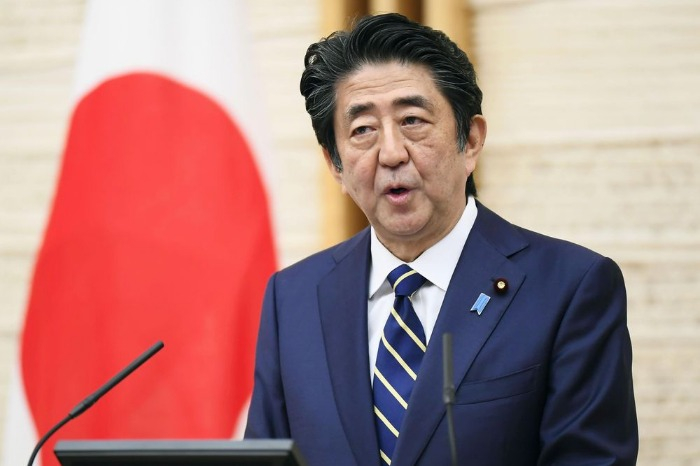Defy convention with long-run plans to upvalue Korean stocks
S.Korea is seeking to mimic Japan’s success in reinvigorating capital markets with a Korean version of a value-up program
By Feb 23, 2024 (Gmt+09:00)
LG Chem to sell water filter business to Glenwood PE for $692 million


KT&G eyes overseas M&A after rejecting activist fund's offer


Kyobo Life poised to buy Japan’s SBI Group-owned savings bank


StockX in merger talks with Naver’s online reseller Kream


Meritz backs half of ex-manager’s $210 mn hedge fund



The South Korean stock market has been on an upward swing in recent weeks, with many partly attributing it to President Yoon Suk Yeol’s pledge to bolster the stock market with a government-led policy, the so-called corporate value-up program.
The program bench-marking Japan’s so-called Abenomics policy reminds investors of the Korean government’s old policy promoted a decade ago by then Finance Minister Choi Kyung-hwan upon his inauguration in July 2014.
Warning that Korea could repeat Japan’s lost decades grappling with protracted economic stagnation following massive real estate and asset price bubble bursts in the 1980s and early '90s, Choi called for a new corporate tax break program designed to encourage Korean companies to invest more and increase dividends to bring wealth to households.
That was proposed when the three arrows of Abenomics, the economic policies advocated by late former Japanese Prime Minister Abe Shinzo during his second term in the early 2010s, were gaining traction as a means to prop up the Japanese economy.

The three arrows were the three pillars of the Abe administration’s economic policy, namely aggressive monetary policy, fiscal consolidation and growth strategy.
Of them, the third arrow was pinpointed by Ito Kunio, the Abe government’s economic advisor and Business Administration Professor Emeritus at Hitotsubashi University, calling for economic growth through capital market restructuring.
In his 130-page report dubbed the “Ito Report,” the professor called for corporate governance reforms for stronger shareholder rights to reinvigorate the Japanese economy, laying the groundwork for the revival of the Japanese stock market.
A DECADE-OLD ABENOMICS ARROW
Based on the report, the Japanese government has implemented the mid- and long-term stock market stimulus program for the past 10 years.
The campaign was not based on a short-run goal to lift share prices only but centered on a long-run project to rejuvenate the world’s No. 3 economy at that time.
The country let the market shore up shareholder rights, while Abe even actively invited activist funds to the market.
Such a mid- to long-term policy finally bore fruit in March last year when the Japan Exchange Group demanded undervalued listed firms with a price-to-book ratio (PBR) of 1 and below to develop remedies to boost share value.

Cheering strong earnings thanks to the weak Japanese currency, local companies have actively responded with generous shareholder-friendly policies over the past year, enabling the Japanese stock market to enter another heyday with a record-high Nikkei share average, in stark contrast to Korea’s benchmark stock index Kospi hovering in the 2,000 levels for about a decade.
Korean stocks’ underperformance underscores the failure of former Finance Minister Choi’s shortsighted policy to stimulate long-term growth.
Some now worry that the Yoon administration’s newly promoted value-up campaign could follow Choi’s policy due to a lack of a long consideration process.
THINK OUT OF THE BOX WITH RADICAL IDEAS
The value-up program was suggested by President Yoon a month ago during his town hall meeting as a way to bolster Korean stock prices, especially those with a low PBR value.
The market's response to the sudden suggestion was mixed. Some downplay the program as a means to appeal to voters before the country’s general election in April.

When low PBR stocks rallied in the past month, Korean retail investors took profits from them worth about 10 trillion won ($7.5 billion), underlining pessimism over the value-up program.
Some people, however, expect that the government will propose unprecedented, surprising remedies to ease the so-called “Korea discount” to win the next presidential election three years later.
Fast followers must prove their sincerity in new strategies in the market to succeed.
Investors will scoff at mundane measures like corporate tax cuts in return for higher dividend payouts or treasury share cancellation.
The government should signal that it is open to reforming the country’s notoriously high inheritance taxes, one of the discount factors for Korean stocks.
While offering companies measures to protect their management rights, it must also encourage them to drastically overhaul their governance structure to ensure that their boards of directors operate for shareholders.
It is time to think outside of the box to offer something radical.
Write to Jin-Hyoung Cho at u2@hankyung.com
Sookyung Seo edited this article.
-
 Korean stock marketForeign investors net buyers of Korean stocks for 3rd straight month
Korean stock marketForeign investors net buyers of Korean stocks for 3rd straight monthFeb 15, 2024 (Gmt+09:00)
1 Min read -
 RegulationsS.Korea should cut inheritance, gift taxes to OECD levels: SME lobby chief
RegulationsS.Korea should cut inheritance, gift taxes to OECD levels: SME lobby chiefJan 23, 2024 (Gmt+09:00)
4 Min read -
 Business & PoliticsSouth Korea set to abolish financial investment gains tax: Yoon
Business & PoliticsSouth Korea set to abolish financial investment gains tax: YoonJan 02, 2024 (Gmt+09:00)
3 Min read


